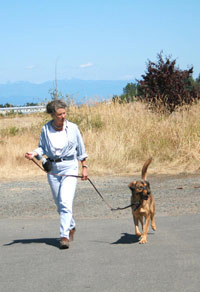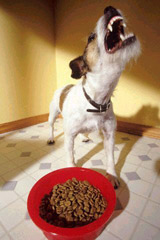The Challenging Dog
Culture Clash
Owners can find their dogs challenging for many reasons, including basic incompatibility or lack of knowledge and skill. All dogs are simply their natural self - a product of breed, temperament and life experience. They are considered ‘challenging’ when their interactions with the world or their owners become problematic.
It is easy to forget that dogs are a different species from us! Nature designed them to be great at what was needed for survival. Just as dogs behave in their typical canine manner, so do people behave in patterns natural to their own heritage (primate and human culture).
Many similarities between people and dogs make dogs the most successfully domesticated animal in the world; however, significant differences in culture exist and can cause misunderstandings and problems. Find out more about this fascinating topic and how it applies to you and your dog by reading such thought-provoking books as The Other End of the Leash by P. McConnell or Culture Clash by J. Donaldson.
WHAT YOU CAN DO:
- Read some of the books recommended on this website (Resources)
- Understand and appreciate biological and cultural differences between dogs and humans
- Learn to understand and speak canine body language
- Question traditional thinking and advice
- Adjust your own communication patterns with dogs to be more effective
- Go to the Dirty Dozen below and learn about the 12 biggest challenges for people when dealing with their dogs.
- Read on and find out about Basic Incompatibility, Breed Challenges and Behaviour Problems
Basic Incompatibility
Dogs are generally not very well understood in our culture. Often, people fall in love with a dog without understanding the particular requirements for living with that individual or with dogs in general. Humans are not born great dog trainers; however, they often have to become knowledgeable to satisfy the special challenges of a beloved pet.
Novice owners commonly learn the slow or the ‘hard way’ as they follow their natural instincts in dealing with their dog’s strong impulses. Even experienced owners are not immune to suddenly find themselves ‘in over their head’. This might happen when they get a dog of significantly different temperament (such as more dominant or more fearful) or at another life stage (e.g. puppies and adolescent dogs are in a more challenging phase of development).

WHAT A SKILLED PROFESSIONAL CAN OFFER:
- Provide pre-adoption counseling to match your personality and life circumstances with the right choice of dog (breed, temperament of individual and life stage)
- Understand and appreciate biological and cultural differences between dogs and humans
- Assess potential compatibilities or incompatibilities in dogs considered
- Direct you to various sources of helpful information (including books, web resources, breeders and rescue organisations)
- Help you to understand critical factors in your own life or personality and how those interact with your dog’s particular requirements
- Devise plans to balance aspects of incompatibility
- Greatly improve your training, leadership and management skills
- If necessary, help to find another home for the dog
Back to top of page
Breed Challenges
Despite having wholeheartedly opened our home to our ‘pet’ dog we are often unaware of the particularities of our breed. Selection pressures have affected breeds for centuries. On closer inspection, history shows that very few breeds (or mutts) were selected to excel as ‘pets’!
Most breeds have their origins in working ability. A large number of breeds were selected to ‘work’ other animals, which meant selection for at least one of the following skills: herding or driving of livestock, or guarding thereof; fighting; hunting with specialties in tracking, treeing, flushing, retrieving, pointing or unearthing; catching and dispatching. A much smaller group of dogs were selected for the services delivered directly to humans such as rescuing, sledding or pulling other loads; being used for food or clothing; property or people guarding; and finally, companionship.
Breeds also differ substantially in their degree of independence from people. While hounds and terriers exemplify the greatest independence, sporting dogs for example were selected to work closely under the direction of humans and are therefore more easily guided and trained.
When choosing a dog, most people dramatically underestimate the strong effects that breed or genetics will have on their dog’s behaviour. It is easy to make one’s selection based on information advertising a breed (from sources such as the Canadian Kennel Club, American Kennel Club, or some breeder info). It takes special skill to understand the "small print".
WHAT A SKILLED PROFESSIONAL CAN OFFER:
- Help understand your dog’s predisposition and abilities and how to work with them
- Understand and appreciate biological and cultural differences between dogs and humans
- Help problem solve and incorporate innate tendencies into a peaceful living arrangement
- Improve communication between you and your dog
- Teach you special methods that work well with your dog’s particular breed or character
- Guide you through the different steps necessary for a successful outcome
- Useful books for breed comparison are The right dog for you by D. Tortora and Choosing a Dog by N. Baer and S. Duno; books of special interest are So Your Dog’s Not Lassie by B. Fisher and S. Delzio; and The Intelligence of Dogs and How Dogs Think by Dr. S. Coren.
Back to top of page
Behaviour Problems
“Call before small problems develop into big headaches!”

Living with behaviour problems means exasperation for owner and dog alike. Unfortunately, we humans unintentionally often contribute to the development of behaviour problems. Separation anxiety, elimination or destructive habits, and many forms of aggression are some of these examples. As well, people often wait far too long to seek help! By the time a professional is called problems have become deeply ingrained habits, well practised and generalized, and the household has commonly gone into ‘crisis mode’!
The good news is that, with competent help, most behaviour problems can be fixed or managed appropriately! Do not wait! It will take significantly less time to stop problems early on than to cure a long-term habit. Essential ingredients to success are a commitment of time and energy, willingness to change and using the services of a skilled professional. To read more about this topic consider books by N. Dodman or W.E. Campbell. For training help on Vancouver Island using humane, dog-friendly and non-confrontational methods contact me
domena@definitelydogs.ca.
Back to top of page
WHAT A SKILLED PROFESSIONAL CAN OFFER:
- Give you an understanding of the problem and all contributing factors
- Formulate a training plan that addresses all those factors
- Devise management options that will immediately alleviate some of the problem’s severity and keep everybody safe
- Show how to improve communication and deepen the bond between you and your dog
- Empower you to be a more effective and non-confrontational leader in your dog’s eyes and make your dog a better ‘follower’
- Teach you and your dog new ways to handle problematic situations
- Demonstrate with your dog and coach you in new training activities
- Ongoing encouragement, fine-tuning and problem solving
- Contact me
domena@definitelydogs.ca to get things started!
The Dirty Dozen - 12 Obstacles on the Path of Training Success:
1. Lack of understanding of how and what dogs communicate
2. Inattention
3. Lack of effective, non-confrontational leadership
4. Reacting rather than preventing and managing
5. Explaining things in words
6. Focussing on things gone wrong
7. Letting things escalate until traumatic events occur
8. Expecting changes in the dog without making changes in one’s own behaviour
9. Snail timing (reaction time in humans is about 10 times slower than in dogs)
10. Lack of positive reinforcement (meaningful rewards, repeatedly and on time)
11. Lack of patience when teaching and consolidating new behaviours
12. Underestimating the role of distractions in training dogs
For a list of the twelve solutions to the dirty dozen, or for help with your dogs, contact me domena@definitelydogs.ca or another competent trainer in your area!